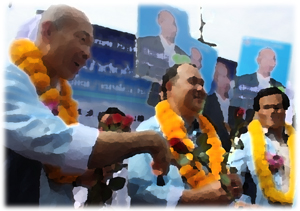People in the deep South are bored with politics
 As the country is gripped by election fever with political parties trumpeting their own brands of populist policies and blueprint to deal with insurgency problem and to restore peace in the far South, a handful of community leaders have recently shared their views on the unrest and on the politicians themselves with a team of reporters from Isra news agency.
As the country is gripped by election fever with political parties trumpeting their own brands of populist policies and blueprint to deal with insurgency problem and to restore peace in the far South, a handful of community leaders have recently shared their views on the unrest and on the politicians themselves with a team of reporters from Isra news agency.
The followings are their opinions:
Mr Yusoh Ma, a 50-year old imam at Ban Kalang mosque in Bannang Sata district of Yala province, said that, in the past, during the lead-up to an election, villagers would gather at various tea houses to discuss politics and the election. “But not now. It is very quiet. I asked several people and was told that they were bored with politics and the politicians,” he said.
The imam said that the villagers felt that they were duped by the politicians who made a lot of promises during the election campaign but did nothing after the election was over.
As for himself, he said he didn’t mind whether the next prime minister would be a woman or a man as what he did care was that the prime minister must be sincere. “These days, the people here have not expected that the new government will be able to solve the unrest problem. They feel that the problem cannot be resolved and there will never be peace so long as all the conditions which are the real cause of the problem have not been properly addressed first,” he added.
Mrs Kawleeyoh Halee, a member of the southern human rights subcommittee and a community leader of Tambon Kuan Noree, Kok Pho district of Pattani, admitted that she was not excited with the upcoming election but instead felt desperated.
She said all the election candidates were “old faces” who are only interested in “sharing of the cake”. “As usual during the electioneering, politicians will come in droves to visit the people and will not hesitate to kowtow the people in order to gain their votes. But when they get elected, they will simply disappear and never be seen,” she said.
Mrs Kawleeyoh noted that during the past seven years of escalated violence in the far South she scarcely saw a single MP representing the three southernmost provinces visit the people in their constituencies.
As for the next prime minister, she said she wanted the prime minister to be dedicated for the interest of the people “not an aggressive type who will quarrel with all the opponents”. “He also must be well versed with the problems in the far South, especially the injustice problem,” she added.
Commenting on the Nakhon Pattani, a model of semi-independent administration proposed by the Pheu Thai party, Mrs Kawleeyoh said, personally, she said the proposal was just an election ploy to buy votes from the local people. The proposal is easier said than done and, moreover, most of the local people are unaware of it, she said.
Mrs Preeda Kruadaeng, leader of a health promotion club in Pattani, said she didn’t think the idea of a special administrative zone or a semi-independent administration for the deep South would be a solution to the unrest problem.
However, she expected the new government to address the “mouth and stomach” problem and the insurgency problem.
Mr Pratheep Muaksakul, director of Takbai vocational college in Narathiwat, said that the country is in need of a compromising prime minister who will be able to bring about national reconciliation.
Regarding the Nakhon Pattani proposal and other models of self-rule for the deep South, Mr Pratheep said he wondered whether those who made the proposals had ever sought the opinions of the local people about them.
